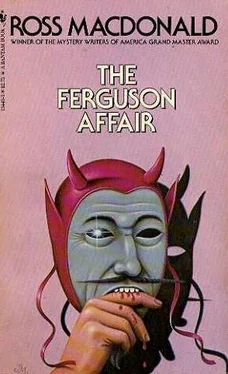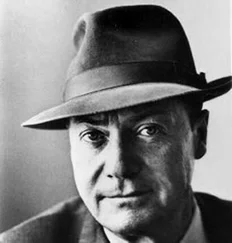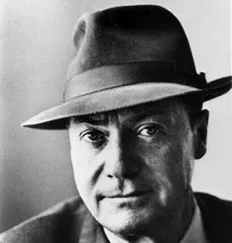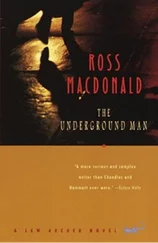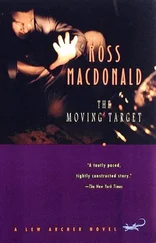“How do you know?”
“I hear things.”
“Voices?”
“I’m not nuts, if that’s what you think. I got a friend, a nurse’s aide in emergency. She’s been working in the hospital twenty years. She knows things the doctors never hear of. She said that Broadman was dead when they brought him in. She said he looked to her like he was strangulated. And Manuel saw Granada crawl into the ambulance with him. Granada was in there talking to Broadman, but Broadman wasn’t saying anything.” She gave me a sideways glance that was dark and heavy. It was like the knowledge of evil itself peering out between her eyelids. “You were there, weren’t you? You saw it happen.”
My mind picked its way back through the obstacle course of the night’s events, to the previous afternoon. Broadman had cried out in fear and rage. Granada had been in the ambulance alone with him, ostensibly soothing him. He had soothed him very effectively, perhaps.
“I couldn’t see what happened,” I said. “What is your friend’s name-the nurse’s aide?”
“I promised her I wouldn’t pass it on. That promise I keep.”
“Why would Granada kill Broadman?”
“To keep him quiet. Broadman knew Granada is a crook.”
“A member of the burglary gang?”
“Maybe.”
“But if Granada was in on the burglaries, Gus would know.”
“They didn’t tell Gus everything.”
“So you can’t say for sure that Granada was involved?”
“No, but I think he was. When Gus bust into a house or a store he always knew where the cops were, and he didn’t do it by X ray. He had a pipeline to them.”
“He told you that?”
She nodded emphatically. The shawl slipped down from her head. Her hair was uncombed and matted, like torn black felt. She covered it, with a quick and angry gesture.
“But he didn’t say it was Granada?”
“No. He didn’t say that. Maybe he didn’t know. There wasn’t much I couldn’t get out of him, if he had it in him.”
Her refusal to make a blanket accusation against Granada was the most convincing element in her story so far. After stating my suspicions to Wills, I was having a reaction. I had to be very sure of Granada’s guilt before I spoke out again.
“Who else was in the gang, Secundina?”
“Nobody else that I know of.”
“No women?”
Her eyes shrank to bright dark points turned on me from the ambush of her shawl. “You got no call to point a finger at me. I did my best to talk Gus out of doing what he was doing.”
“I don’t mean you. You’re not the only woman in the world. Didn’t Gaines have any girl-friends?”
Her heavy black lashes came down and veiled her eyes completely. “No. I mean, how would I know?”
“I heard he was running with a blonde.”
Her eyelids quivered, but her mouth was stubborn. “Then you heard more than I did.”
“Who is she, Secundina?”
“I told you I didn’t know about any blonde. I never ever see the guy. Maybe twice in the last two months.”
“Under what circumstances?”
“I don’t know what you mean.”
“I mean where did you see Gaines? What was he doing?”
“I don’t remember,” she said stolidly.
“Have you known Gaines long?”
“Gus did. He knew him for six-seven years. He met him in Preston, and after they got out, they drove around the country for a while, living off of the country. Then Gus came back and married me, but he used to talk about this Harry. Gaines called himself Harry in those days. He was kind of a hero to Gus, he did such wild things.”
“Like what?”
“Like conning people and stealing cars and driving faster than anybody and all like that. Crazy stuff. I warned Gus when he took up with Gaines again, last fall. I warned him that Gaines was trouble. He didn’t listen to me. He never had the brains to listen to me.”
She gazed across the street at the hospital. A local bus stopped at the opposite corner, and the student nurses got on. Secundina became aware of the bus as it roared away. “Now I missed my bus.”
“I’ll take you home.”
“What’s the use of go home?” she cried in a raw voice. “So I can tell my children they got no father? What’s the use of anything?”
She sat like a monument to her own grief. Something had broken in her, releasing the bitter forces of her nature. She seemed to be submitting to them, hoping they would destroy her.
There was nothing I could think of to say, except: “Your children need you, Mrs. Donato. You have to think of them.”
“To hell with them!”
But she was terrified by her words. She crossed herself, and started to mutter a prayer. In spite of the cool shade of the pepper tree, I was beginning to sweat. I’d never been so conscious of the wall between my side of town and hers.
A dirty black Buick convertible came down the street in front of the hospital. Tony Padilla was driving, slowly, looking for someone. He saw us on the bench and drew in to the red curb.
“Hello, Mr. Gunnarson,” he said in a subdued voice. “I was in the hospital looking for you, Mrs. Donato. Your sister said I should bring you home. You want to get in?” He leaned across the front seat and opened the door for her.
I caught a glimpse of her tiny, high-arched foot. Red toenails gleamed through the plastic toe of her shoe. “May I see you for a minute, Tony?”
“You see me,” he said across her. He didn’t want to talk to me, and was using her as a buffer.
“What happened to Colonel Ferguson? I thought you were holding his hand.”
“Until he gave me the brush-off. He went to drop the money off-”
“Where?”
“I dunno. He didn’t tell me, didn’t want me along. So I went down to Secundina’s place. I wanted to talk to her some more. Her sister said she was here at the hospital.” He smiled and shrugged automatically, and glanced at the watch on his wrist. “I just got time to take her home before I go to work.”
He put his car in gear.
MY PATH TO THE PARKING LOT led past the emergency entrance of the hospital. The ambulances were garaged across the street, and one of them was parked in the driveway facing into the street. The old youth named Whitey lounged at the wheel, listening to the radio. He turned it low when I came up to the window of the cab. “Can I help you, sir?”
“You may be able to. I saw you at Broadman’s store yesterday when you took him away. My name is Gunnarson.”
“I remember you, Mr. Gunnarson.” He tried to smile, without much success. His pale lippy face wasn’t made for smiling. “Broadman died on the way here, poor old boy. I hated to see it happen.”
“Was he a friend of yours?”
“I never saw him before in my life. But I have an empathy with them. Like we’re all fellow mortals together. Dead or alive. You know?”
I knew, though I didn’t like the way he put it. He seemed to be one of those sick-bay philosophers-sensitive wounded souls who lived by choice in the odor of sickness, flourished like mushrooms under the shadow of death.
Whitey’s eyes were like nerve ends. “It kills me to see a man die.”
“How did Broadman die?”
“He simply passed away, man. One minute he was yelling and struggling, trying to get up-he was real panicky. The next minute he sighed and was gone.” Whitey sighed and went a little himself. “I blame myself.”
“Why blame yourself?”
“Because I didn’t dream he was going to die on me. If I had only known, I could have given him oxygen, or drugs. But I let him slip away between my fingers.”
He raised one hand to the window and looked at his fingers. They dangled limply. He rested his chin on his chest, and his long face sloped into sorrow. His pale eyes appeared ready to spurt tears. “I don’t know why I stay in this awful business. There are so many disappointments. I might as well be a mortician and get it over with. I mean it, man.” He was going down for the third time in an ocean of self-pity.
Читать дальше
